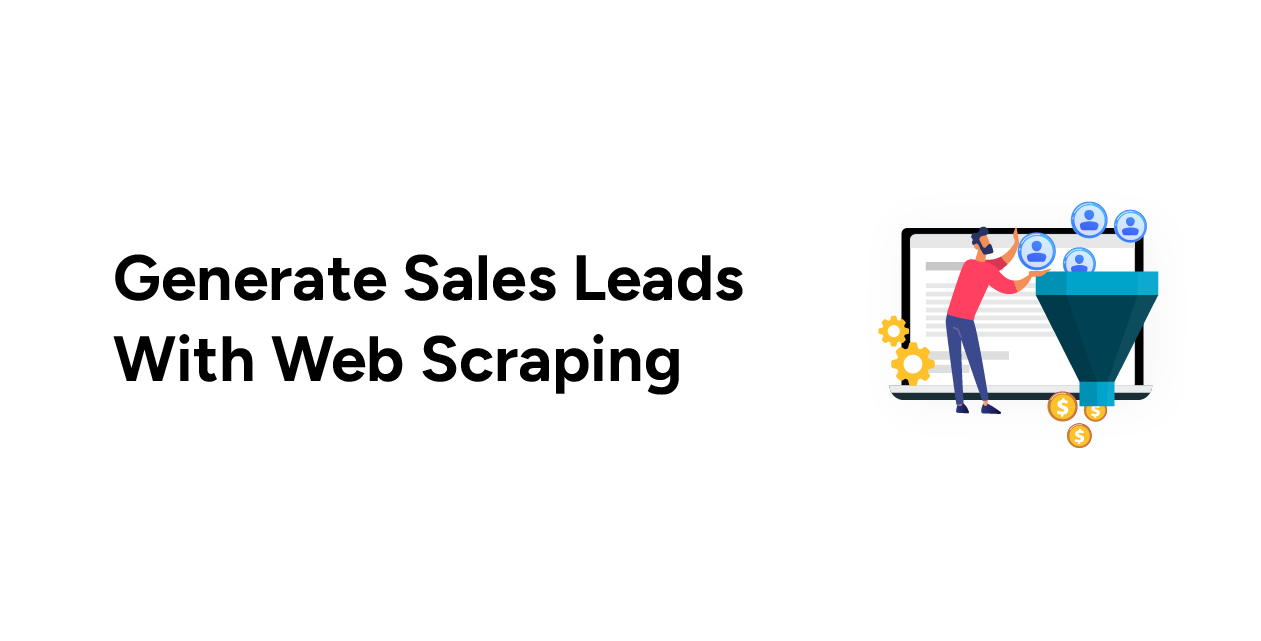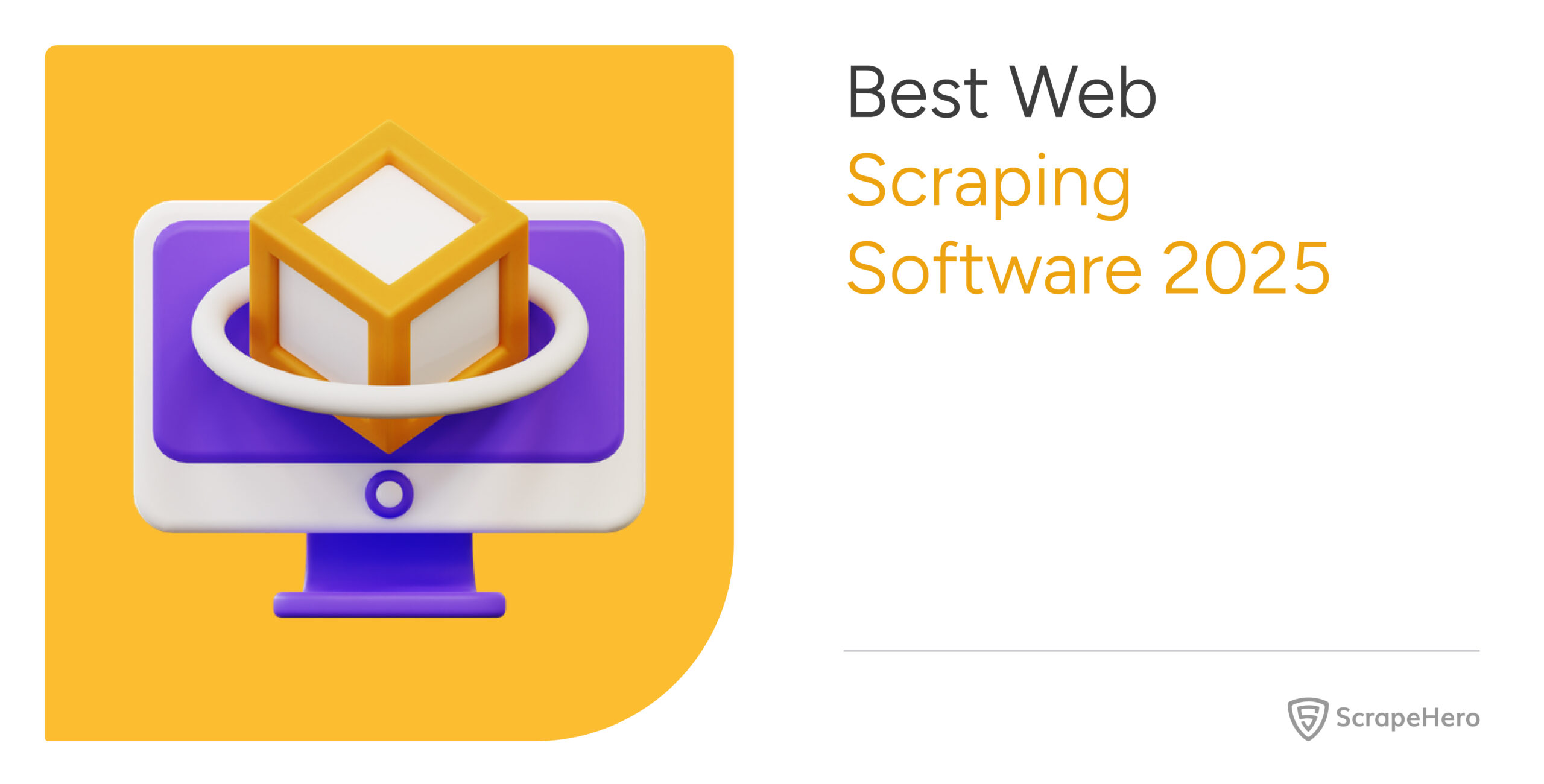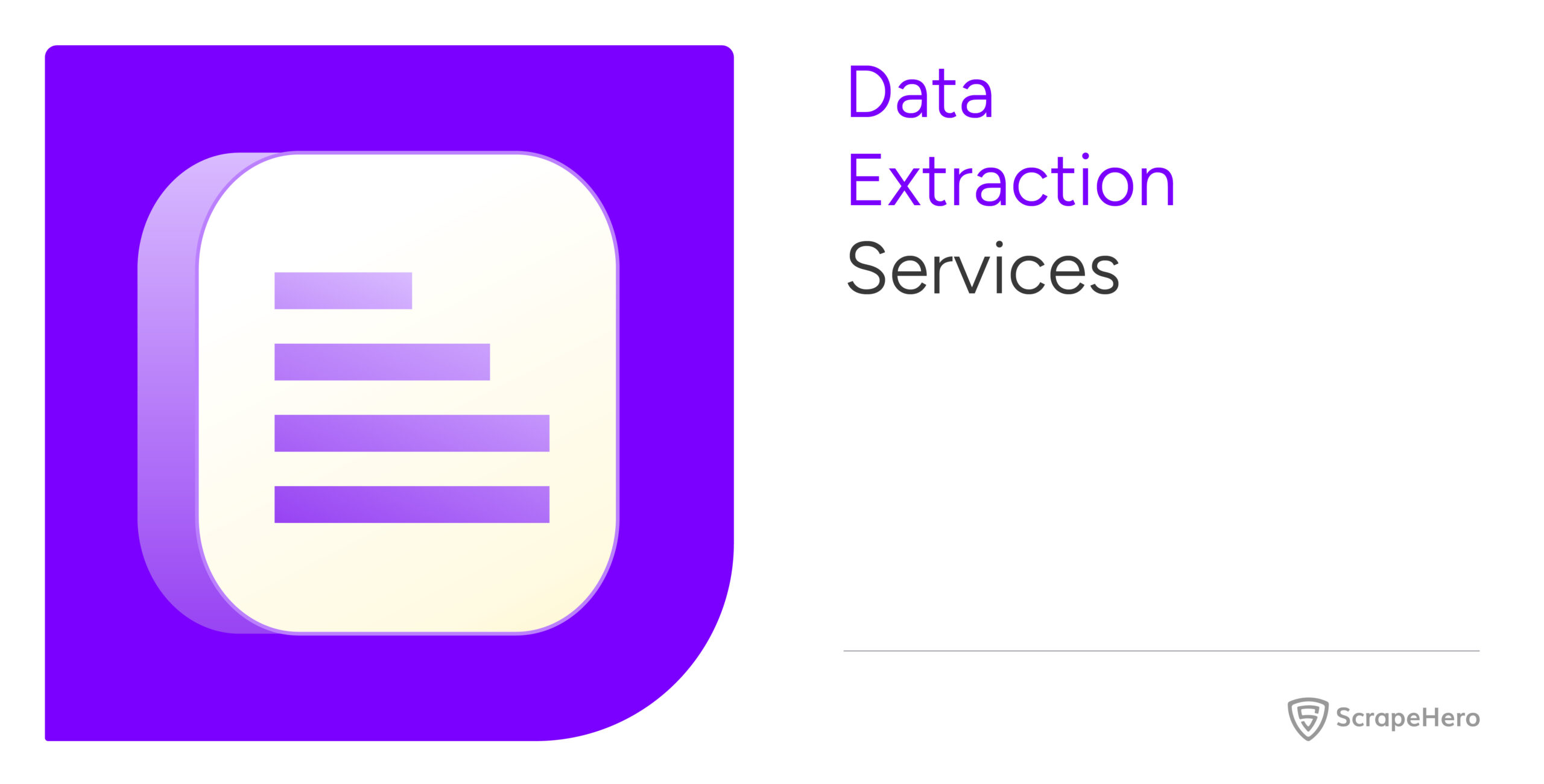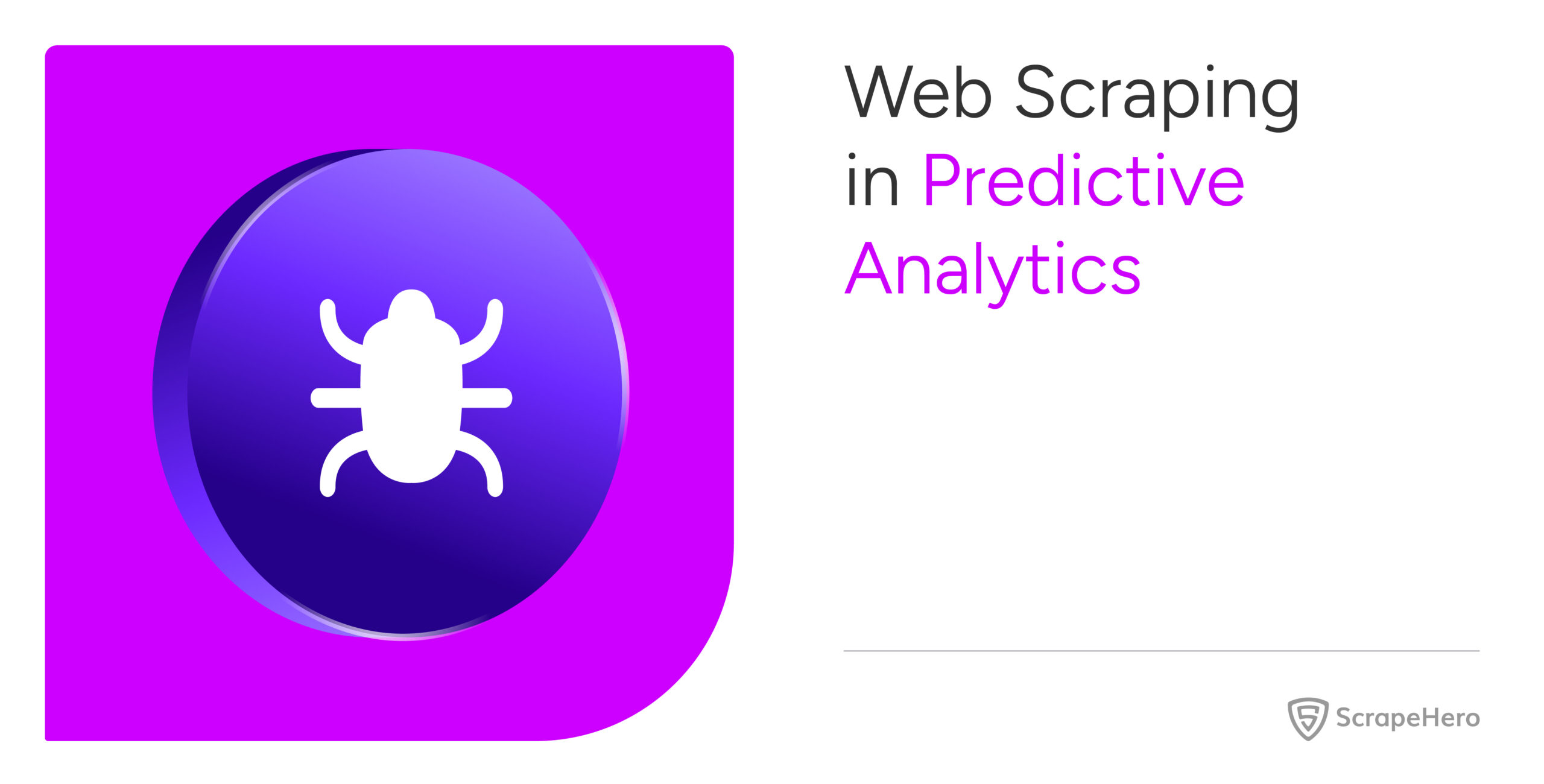The e-commerce business landscape is a continually evolving space, marked by emerging trends and intensifying competition. Businesses here are on the lookout for effective ways to distinguish themselves from the crowd.
Web scraping is one such tool preferred by businessmen that enables them to gather and analyze vast amounts of data from the internet. By analyzing relevant data from the internet, businesses can gain critical insights into market trends, customer preferences, and competitor strategies.
However, web scraping is not limited to understanding the market; it can also be utilized to generate leads. By extracting data from relevant online sources, businesses can identify potential customers, understand their needs and preferences, and tailor their approach to meet these specific demands. This targeted approach enhances the efficiency of lead generation and significantly boosts the chances of converting these leads into sales.
In the following sections, we will dive deeper into how to generate leads with web scraping.
What is Lead Generation Web Scraping
Sales lead generation is the process of identifying potential customers or clients for a business. Leads typically include contact information or other relevant details of individuals or companies that are likely to be interested in the products or services offered by a business.
In sales lead generation web scraping, web scraping tools and techniques are used to automate the collection of potential lead information from various online sources. This could include business directories, social media platforms, professional networking sites, and other websites where potential leads might leave their contact information.
This approach is commonly used in sales and marketing to build a database of leads that can be contacted for sales pitches, email marketing, networking, and other business development activities.
Why Do Brands Need to Generate Sales Leads
Sales lead generation is crucial for brands for several key reasons:
Sustained Business Growth: Generating sales leads is fundamental for the continuous growth of a business. Leads represent potential customers who might purchase a product or service, thus directly contributing to revenue and profit growth.
Market Expansion: Through effective lead generation, brands can identify and tap into new market segments. This expansion into new customer bases ensures that the brand remains dynamic and adaptable to changing market trends.
Enhanced Brand Awareness: The process of lead generation often involves spreading information about a brand, its values, and offerings. This not only attracts potential customers but also enhances overall brand awareness and reputation in the market.
Competitive Advantage: In highly competitive markets, effectively generating and managing leads can give a brand a significant edge. It allows businesses to engage with potential customers before their competitors do, securing a larger market share.
Resource Optimization: Generating high-quality leads ensures that sales and marketing resources are not wasted on uninterested or unqualified prospects. This optimization of resources leads to more efficient and cost-effective business operations.
Long-term Customer Relationships: Lead generation is often the first step in building long-term relationships with customers. By identifying and nurturing these leads, brands can cultivate loyalty and repeat business, which is crucial for long-term success.
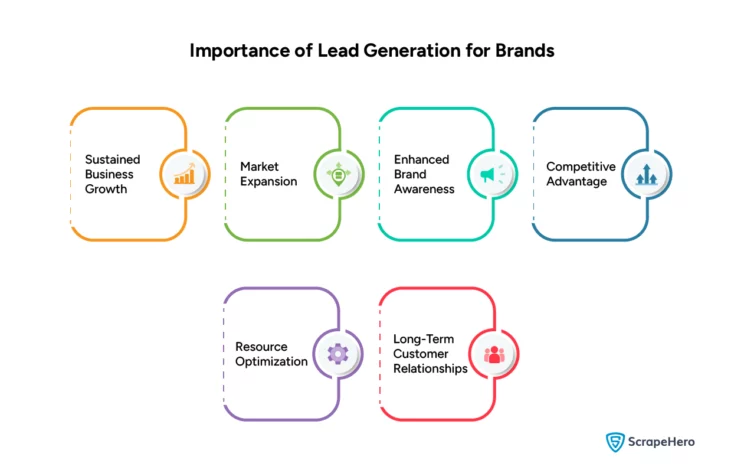
Say Goodbye to Guesswork!
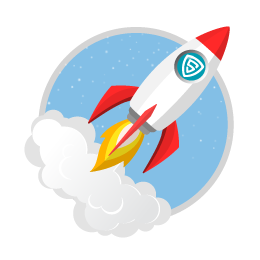
Where Can You Find Your Leads on the Internet
Before we get started with how to generate business leads using web scraping, let us see which are some of the places on the internet that will have the relevant details of individuals or companies that are likely to become your clients.
Business Directories
Business directories are websites or online platforms that list businesses, typically categorized by industry, location, or size. They often include key details like business names, addresses, contact information, types of services or products offered, and sometimes ratings or reviews.
It is possible to scrape sales leads from Yelp, Yellow Pages, Manta, and industry-specific directories.
Yelp
Yelp is an online platform and mobile app which publishes crowd-sourced reviews about businesses. The primary function of Yelp is to help people find great local businesses like dentists, hair stylists, restaurants, bars, shops, and more.
Businesses use Yelp for lead generation due to its vast user base and the rich data it offers. The platform’s reviews and ratings can help identify popular and reputable businesses, which can be valuable leads. Additionally, the detailed business information available on Yelp makes it a prime target for scraping contact and service details.
Yellow Pages
Yellow Pages is a traditional business directory that has transitioned into an online platform. It lists businesses across various categories, providing essential information like addresses, phone numbers, and service descriptions. Yellow Pages is known for its comprehensive listings of local businesses and services.
Lead generation with Yellow Pages is used by businesses because of its extensive database of local businesses, making it an excellent resource for location-based lead generation. The directory is particularly useful for businesses targeting specific geographic areas or local markets.
Google Maps
Web scraping from Google Maps allows businesses to identify potential leads based on geographic location, industry, or specific services offered. Furthermore, the platform’s mapping features can aid businesses in visualizing potential market areas and planning targeted marketing campaigns.
A real estate agency can use web scraping to collect data on properties listed for sale on Google Maps. They can analyze property details, pricing, and neighborhood information to identify potential homebuyers. The agency can then reach out with personalized property recommendations based on the buyers’ preferences.
Social Media Platforms
Social media platforms like LinkedIn, Facebook, Twitter, Instagram, and TikTok are abundant with user-generated data, including personal profiles, engagement patterns, and content preferences.
By scraping these platforms, businesses can access potential leads based on users’ interests, online behaviors, and engagement with relevant topics. For instance, imagine you are a company developing project management software that targets small to medium-sized businesses.
You can scrape LinkedIn for profiles and posts from businesses that mention project management challenges or interest in productivity tools. And then you can directly reach out to these businesses with personalized demonstrations of how your software can solve specific project management issues.
Company Websites
Company websites serve as a rich source for sales lead generation through web scraping, offering information crucial for business outreach and market analysis. These sites often include contact details, insights into services or products offered, executive information, and the latest company news or blog posts.
By extracting this data, businesses can not only identify potential leads but also tailor their marketing and sales approaches to meet the specific needs and interests of these companies.
For example, a funeral home can employ web scraping techniques to identify potential clients who may require funeral services from obituary websites and online memorial platforms. By scraping the websites, the funeral home will have access to up-to-date information about recent passings, including names and locations.
This data enables them to reach out with respectful and timely offers of their services, such as funeral planning, memorial services, or grief counseling. This targeted approach allows them to connect with families in their time of need, offering support and services that are pertinent, thereby improving their chances of being selected to provide these essential services.
Why Use Web Scraping for Lead Generation
Using web scraping to generate sales leads offers several significant advantages for businesses:
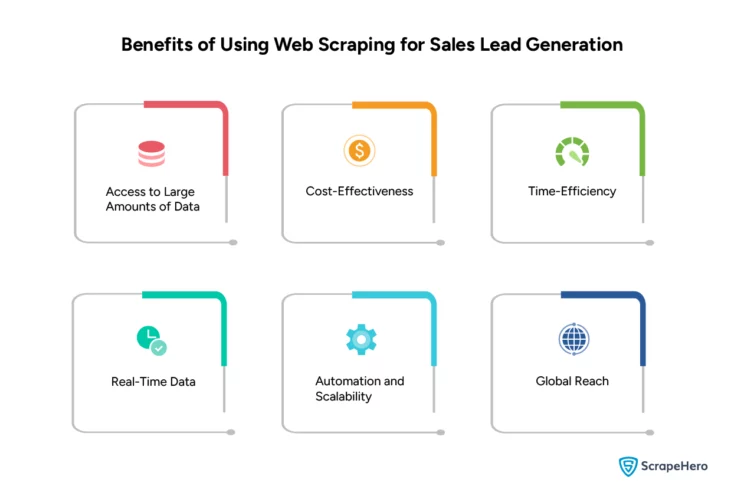
Access to Large Amounts of Data: Web scraping allows you to collect vast quantities of data from various online sources. This data can include potential customer contact information, preferences, behaviors, and more, providing a rich resource for lead generation.
Cost-Effectiveness: Compared to traditional methods of lead generation, web scraping can be more cost-effective. It automates the process of data collection, reducing the need for manual labor and thus saving on costs.
Time Efficiency: Web scraping tools can gather data much faster than human efforts alone. This speed means businesses can quickly amass a large number of leads, enabling them to act swiftly in their marketing and sales efforts.
Real-Time Data: Web scraping provides access to the most current information available online. This real-time data is crucial for businesses to stay updated with market trends, consumer sentiments, and emerging opportunities.
Automation and Scalability: Web scraping processes can be automated and scaled according to the needs of the business. This flexibility allows companies to adjust their lead generation efforts as they grow or as market conditions change.
Global Reach: Web scraping is not limited by geographical boundaries, enabling businesses to gather leads from international markets and expand their global footprint.
Say Goodbye to Guesswork!

How Can the Scraped Sales Leads Data be Used for Business Enhancement?
Once data has been collected through web scraping, it opens up a multitude of opportunities for various types of cold outreach. Each method offers unique advantages and can be tailored based on the nature of the data collected. Let’s explore how this data can be utilized effectively across different outreach channels.
Emails:
The scraped data can be used to create personalized emails. This could be as simple as addressing the recipient by name or as complex as tailoring the content based on their interests or past behaviors.
Segmenting your email list based on demographics, purchasing behavior, or engagement history allows for more targeted and relevant messaging. It is also possible to implement automated email campaigns that trigger based on specific actions taken by the lead, such as visiting a particular page on your website.
Messaging Apps:
Messaging apps offer a direct line to potential customers. Use the data to send personalized news and updates, keeping your brand at the forefront of their minds. It is also possible to send follow-up messages based on previous interactions with the clients, creating a more dynamic and responsive communication strategy.
Phone Calls:
The scraped data can be used for informed conversations with your potential clients. You can tailor your call scripts based on the collected data, addressing potential pain points or specific interests of each lead.
Social Media Posts:
The insights gained from utilizing the data can be used for targeted advertising on social media platforms. Create ads that appeal specifically to the interests and behaviors of your target audience.
Your social media content can be tailored based on the interests of your leads. This could include blog posts, videos, infographics, and more. Monitor engagement on your posts and use this data to refine your social media strategy.
Traditional Postal Mail:
Use the data to send personalized mailers. This could include special offers, information about products or services, or industry-specific content. Combine postal mail with digital efforts. For example, follow up a mailer with an email or a phone call.
CRM Integration:
Integrating CRM with web-scraped sales lead data is essential for enhancing outreach strategies. By centralizing lead data in a CRM system, businesses can automate workflows, prioritize and score leads, and track personalized interactions across various channels, including emails, phone calls, social media, and postal mail.
This integration allows for detailed segmentation and targeted outreach, ensuring more effective communication. The synergy between CRM and lead data streamlines the lead management process and significantly boosts the potential for successful conversions and long-term customer relationships.
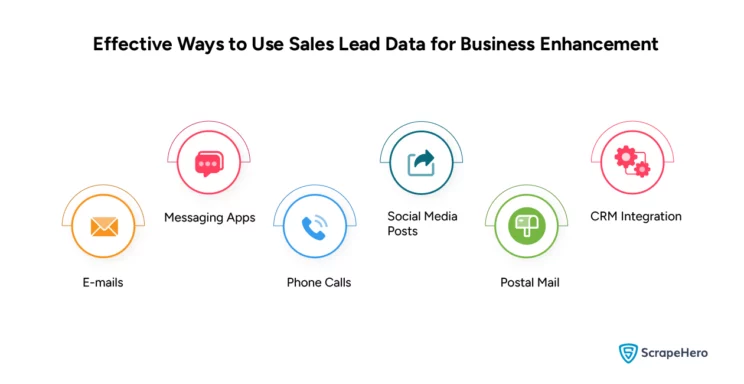
The key is to use the information gathered to create more personalized, targeted, and engaging interactions with potential leads. This approach not only increases the likelihood of conversion but also helps in building lasting relationships with customers.
Why it is Better to Leave Web Scraping Sales Leads to an Expert
Imagine you run an insurance company that wants to expand its customer base by partnering with hospitals and clinics. As a company whose primary focus is elsewhere, you might lack the technical expertise and resources to scrape vast amounts of data from multiple sites efficiently.
By outsourcing to a web scraping expert, your company can obtain a comprehensive and targeted list of potential leads, including names of hospitals and clinics, their locations, specialties, contact information, and details about the medical staff.
This approach saves you time and resources. Sales teams can then reach out to these hospitals and clinics with tailored proposals for partnership.
To conclude, outsourcing your web scraping requirements offers the following benefits:
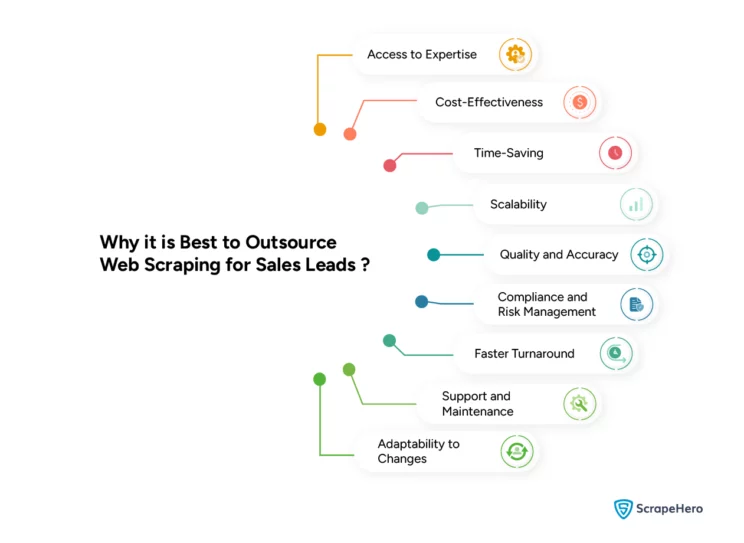
Access to Expertise: Outsourcing companies specialize in web scraping, ensuring that you have access to the latest tools, technologies, and expertise.
Cost-Effectiveness: It can be more cost-effective than maintaining an in-house team, especially for businesses without continuous scraping needs. This approach saves on recruitment, training, and technology costs.
Time-Saving: It frees up your internal resources, allowing your team to focus on core business functions rather than managing the complexities of web scraping.
Scalability: Outsourcing firms can easily scale operations up or down based on your requirements, providing flexibility for project size and frequency.
Quality and Accuracy: Professional scrapers often have better mechanisms to ensure high-quality, accurate data, which is crucial for effective decision-making.
Compliance and Risk Management: Experts are more likely to be aware of and compliant with legal and ethical guidelines, reducing the risk of data breaches and legal issues.
Faster Turnaround: Outsourcing can lead to quicker setup and execution of scraping projects, resulting in faster turnaround times for data delivery.
Continuous Support and Maintenance: Outsourcing services typically include ongoing support and maintenance, ensuring that the scraping process continues to run smoothly over time.
Adaptability to Changes: Professional web scraping services are adept at adapting to changes in website structures, data formats, and scraping technologies, ensuring consistent data flow.
For businesses looking to outsource their web scraping needs, ScrapeHero is a highly recommended expert in the field. They provide comprehensive, tailored data solutions, ensuring you receive accurate, timely, and high-quality data to meet your specific business requirements.
Conclusion
The ever-evolving e-commerce landscape demands innovative and efficient strategies for businesses to distinguish themselves. Web scraping is a key tool in this arena, offering the data to figure out invaluable insights into market trends and customer behaviors and playing a crucial role in effective lead generation.
By extracting and analyzing web data, businesses can identify and understand potential customers, tailor their marketing strategies, and significantly improve their chances to convert leads into sales.
However, the complexities and technicalities of web scraping require specialized skills, making it a task best left to the experts. With their expertise in web scraping, ScrapeHero offers tailored, efficient, and precise data solutions, enabling businesses to capitalize on data-driven insights while focusing on their core business goals.

